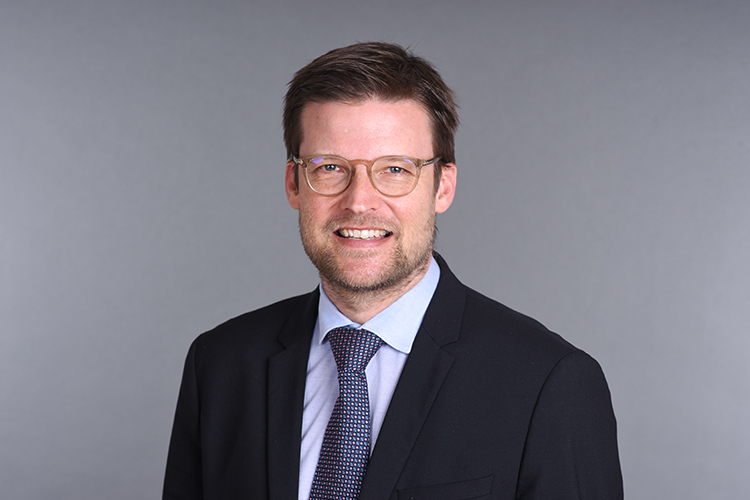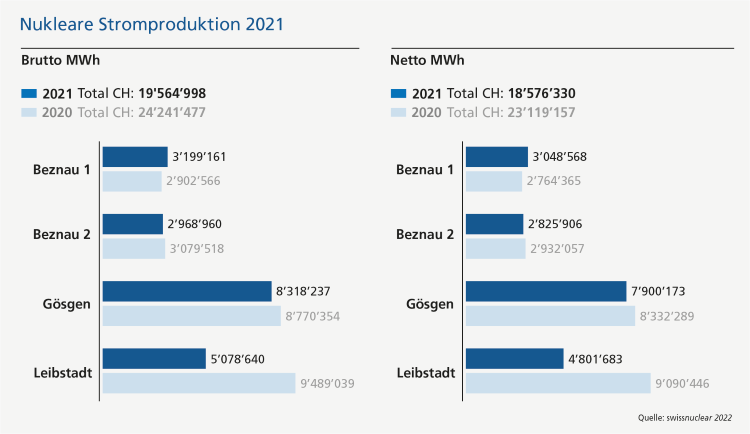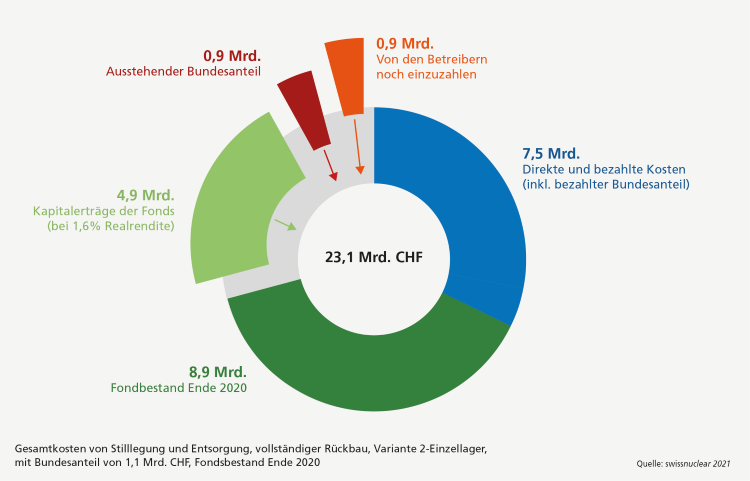The Swiss nuclear power plants produced around 23.467 TWh of electricity in 2023 and once again proved to be a reliable pillar of the energy supply. Thanks to extensive investment and modernization, the plants will continue to make a decisive contribution to the country's security of supply in the future.
Olten, 23.02.2024 - Switzerland's nuclear power plants were once again characterized by high availability and safe, reliable electricity production last year. The reactors at the Beznau (KKB), Gösgen (KKG) and Leibstadt (KKL) nuclear power plants were in continuous operation, apart from the scheduled annual overhauls in the summer.
After setting a new production record in 2022, the KKL reached its third-highest production mark in 2023 since the start of continuous operation in 1984. Last year, the plant located on the Rhine produced as much electricity as is consumed by around 2 million households per year.
Reliable long-term operation thanks to modernizations
The KKL celebrates its 40th birthday in 2024. This means that Switzerland's youngest nuclear power plant will also be entering long-term operation. This is of central importance for security of supply and for the country's economic development. Modernization is essential to ensure that Swiss nuclear power plants continue to produce electricity safely, reliably and with low emissions in the future. The operators take this task seriously:
For further information: Communication swissnuclear, medien@swissnuclear.ch.
Swissnuclear is the industry association of Swiss nuclear power plant operators (Axpo Power AG, BKW Energie AG, Kernkraftwerk Leibstadt AG and Kernkraftwerk Gösgen-Däniken AG) and represents their common interests. The majority of the member companies are publicly owned and generate around one third of domestic electricity production. Swissnuclear supports Swiss nuclear plants in safe and sustainable operation and in the further phases of the life cycle and is committed to optimizing internal and external framework conditions. The association also promotes objective dialog on nuclear energy in the industry and society and coordinates activities across power plants. |
For further information:
Communication swissnuclear, medien@swissnuclear.ch.
The members of swissnuclear elected two new board members and Roland Schmidiger as association president at the last association meeting. The latter succeeded Philipp Hänggi at the beginning of 2024. swissnuclear also gained a new Managing Director in Roger Lundmark at the end of 2023.
Olten, 22.01.2024. Roland Schmidiger was elected President of swissnuclear (sn) at the association meeting on December 12, 2023. He has been a member of the Board of Directors since the beginning of 2023 and represents Axpo Power AG and Kernkraftwerk Leibstadt AG on the Board. In him, the Association of Swiss Nuclear Power Plant Operators has gained an experienced leader as President. Roland Schmidiger started his career at Axpo in 2005 as Head of Asset Management Nuclear and moved to the Beznau nuclear power plant in 2013 - first as Project Manager for major projects, then as Head of Department and Deputy Head of Power Plant and from 2020 as Head of Power Plant. Last year, Axpo finally appointed him Division Head Nuclear.
Philipp Hänggi, who stepped down as President at the end of 2023, had headed the association since 2019. The doctor of physics was a member of the sn Board of Directors from 2014 as a representative of BKW Energie AG. As the first Managing Director between 2003 and 2014, he played a key role in establishing the association, which became independent in 2017. His commitment was recognized and thanked at the association's general meeting in December.
New Board members and Roger Lundmark as Managing Director
Philipp Hänggi left the sn Board at the end of 2023 at the same time as handing over the chairmanship. As the new representative of BKW, the association meeting elected Stefan Klute, who as Head of Nuclear is responsible for the dismantling of the Mühleberg nuclear power plant and the company's nuclear portfolio. The Annual General Meeting also appointed Alexander Puhrer as a future member of the Board of Directors. He will take over as Managing Director of Kernkraftwerk Gösgen-Däniken AG on March 1, 2024, replacing Michaël Plaschy. The latter has been a member of the three-member board since 2009 and chaired the association from 2014 to 2019. As a member of the board, he was particularly committed to promoting research conducted by sn.
At the end of 2023, the sn office also gained a new head in Roger Lundmark. The physicist and long-standing head of the Power Plant Support department replaces Wolfgang Denk, who is taking over as Head of Strategic Projects at his own request. He will thus be responsible for central projects in the sector relating to deep geological repositories.
For further information:
Communication swissnuclear, medien@swissnuclear.ch.
With regard to future negotiations on possible compensation and indemnities in connection with the deep geological repository for radioactive waste, initial talks between the companies responsible for waste disposal and the siting municipalities and cantons are pending. The companies will approach the talks in a spirit of partnership and with an open mind.
Remuneration and compensation are voluntary payments made by the waste producers - nuclear power plant operators and the federal government - to the sites of the deep geological repository and the associated fuel element packaging facility. Payments and compensation are intended to recognize the contribution of the siting region to solving a national task: the disposal of all radioactive waste in Switzerland, both from the operation of nuclear power plants and from medicine, industry and research.
Establishing a sustainable partnership
In 2023, initial talks will take place between the companies responsible for waste disposal and the municipalities and cantons where the sites are located. The aim of this phase of talks is to get to know the partners, understand their needs and prepare for the negotiation phase. Among other things, it is also about how a sustainable, intergenerational solution and a cooperative neighborhood can be designed.
The discussion phase is followed in due course by a negotiation phase with the aim of reaching a mutually acceptable contractual arrangement. This regulation can only take effect once the general licenses have become legally binding. Based on current information, the Federal Council will be able to issue these permits from 2029.
Discussions on compensation and offsets take place independently of the general license procedure. This procedure is based solely on the application documents prepared by Nagra on the basis of technical and scientific criteria and regional project planning discussions. This is supplemented by expert opinions and statements.
Christian Schoenenberger becomes discussion leader
Swissnuclear is accompanying the talks on behalf of the operators of nuclear facilities subject to disposal obligations. For the talks and the preparation of the negotiation phase, swissnuclear would like to establish a cooperative relationship between all stakeholders from the outset. For this reason, swissnuclear has brought in Dr. Christian Schoenenberger to support the talks.
Christian Schoenenberger holds a doctorate in natural sciences from ETH Zurich and was in the Swiss diplomatic service from 1990 to 2022. As a representative of the Federal Department of Foreign Affairs, Christian Schoenenberger was involved in various discussion processes and negotiations.
Swissnuclear is convinced that Christian Schoenenberger can contribute to a good understanding of the positions of the parties involved in the run-up to the negotiations. As the lead negotiator for the operators responsible for waste disposal, he will bring his many years of diplomatic experience to bear constructively on behalf of all parties.
For further information: Communication swissnuclear, Tel. 062 205 20 10, medien@swissnuclear.ch.
Media release swissnuclear_Talks on settlements and compensation (95 KB)
Following extensive scientific investigations, the National Cooperative for the Disposal of Radioactive Waste (Nagra) has designated the sites for the deep geological repository and the placement of the surface infrastructure. With the proposal of the Nördlich Lägern siting region and the Würenlingen interim storage facility (Zwilag), further steps towards a general license and the safe disposal of radioactive waste can be taken.
As part of the Swiss Federal Office of Energy's Sectoral Plan procedure for deep geological repositories, Nagra has developed site proposals for the deep geological repository and the spent fuel repackaging facility on the basis of comprehensive investigations. As Nagra announced today, Nördlich Lägern is the most suitable site for the deep geological repository and Zwilag is the optimal site for the repackaging facility.
Swissnuclear welcomes the announcement of the site proposals by Nagra. This represents an important milestone in the safe disposal of radioactive waste from Swiss nuclear power plants and waste from medicine, industry and research.
Next steps
The site proposals form the basis for the preparation of the application documents for the general license for the deep geological repository with its main above-ground and underground structures and for the packaging facilities. The general license process is prescribed in the Nuclear Energy Act. It is concluded with an optional referendum after examination by the competent authorities and approval by the Federal Council and Parliament.
For further information: Communication swissnuclear, Tel. 062 205 20 10, medien@swissnuclear.ch.
Press release on Nagra's site proposal (45 KB)
Swissnuclear has appointed Wolfgang Denk as its new Managing Director. The qualified mechanical engineer will take up his post on April 1, 2022. Denk succeeds the previous director Dr. Philippe Renault.
After more than seven years, the Association of Nuclear Power Plant Operators is getting a new Managing Director. Wolfgang Denk has many years of experience in the nuclear energy sector thanks to his previous positions at Alstom, Axpo, Alpiq and Westinghouse in Belgium and France, among others. From 2011 to 2016, Wolfgang Denk was responsible for the management, optimization, evaluation and contract management of electricity production from nuclear power plant participations and electricity import contracts in the nuclear production department at Alpiq. Denk was also a member of the Board of Directors of the Leibstadt nuclear power plant. He has already represented the interests of the Swiss nuclear industry in various national and international commissions and expert groups in the past. Most recently, Denk was Senior Risk Manager at Credit Suisse Asset Management in the energy infrastructure sector.
Wolfgang Denk (46) has the best qualifications to take over the business quickly and smoothly and to represent swissnuclear's interests at home and abroad. He holds a degree in mechanical engineering with a postgraduate degree in industrial engineering (MBA & Eng.). Wolfgang Denk is married and has two daughters.
For further information: Communication swissnuclear, Tel. 062 205 20 10, medien@swissnuclear.ch.
((Image caption))
Wolfgang Denk, Dipl.-Ing. FH

Media release_Change in the management of swissnuclear (45 KB)
In 2021, the four Swiss nuclear power plants produced a net 18.6 million megawatt hours (MWh) of electricity (previous year: 23.1 million MWh). The reason for the decline was time-consuming modernization projects at the Leibstadt nuclear power plant, which resulted in a six-month shutdown for maintenance. Nevertheless, Swiss nuclear power plants generated around a quarter of the electricity consumed in Switzerland in 2021.
The Swiss nuclear power plants produced a net 18,576,330 MWh of electrical energy in 2021 (previous year: 23,119,157 MWh). This also includes 104,641 MWh that the Beznau-1 and -2 (24,294 MWh) and Gösgen (80,347 MWh) nuclear power plants supplied to regional residential and commercial buildings in the form of district heating.
The four nuclear power plants are part of Switzerland's system-relevant infrastructure. For this reason, they have also implemented particularly strict coronavirus protection measures in 2021, both during normal operation and during the respective shutdown for maintenance.
Detailed production figures for the power plants
Beznau-1 and 2 nuclear power plants (KKB): Thanks to a high availability rate of 96.5%, unit 1 of the Beznau nuclear power plant increased the amount of electricity generated to 3.05 million MWh net (previous year: 2.9 million MWh). At 2.8 million MWh net, Block 2 remained only slightly below the previous year's production of 2.9 million MWh with an availability of 89.9% due to maintenance work.
Since commissioning, a total of more than CHF 2.5 billion has been invested in the safety and reliability of the two plants. Thanks to the extensive upgrades and modernizations, Beznau-1 and -2 meet all regulatory and statutory safety requirements and comply with the internationally recognized standards of the International Atomic Energy Agency - IAEA.
Gösgen nuclear power plant (KKG): At 7.9 million MWh net, the Gösgen nuclear power plant recorded slightly lower production in 2021 (previous year: 8.3 million MWh). Availability amounted to 90.2 percent. During the annual overhaul, in addition to the recurring inspections and maintenance work, the generator underwent a major overhaul, the condensate cooler was replaced and the deionized water basins were connected to the emergency system to expand the water reserves. In addition, 355 support feet of the cooling tower were refurbished.
For more than three years, the Gösgen nuclear power plant has been focusing on projects to continuously modernize and increase plant safety. KKG will invest around 700 million Swiss francs in these projects by 2029.
Leibstadt nuclear power plant (KKL): During a six-month annual overhaul, the plant implemented two major modernization projects in addition to maintenance and renewal projects. As a result, total net production fell to 4.8 million MWh (previous year: 9.1 million MWh). With the replacement of the condenser and the conversion of the reactor recirculation system, KKL brought two important major components up to the latest technical standard. The new, more efficient plant components also allow Switzerland's newest and most powerful nuclear power plant to increase its output while maintaining the same reactor capacity.
Since 2010, Kernkraftwerk Leibstadt AG has invested more than one billion Swiss francs in the renewal and safety of the plant with a view to long-term operation. This means that the power plant can continue to make an important contribution to Switzerland's security of supply in the future.
Reliable long-term operation for greater security of supply
Swiss nuclear power plants have been a pillar of secure electricity supply for over 50 years. In winter in particular, they supply up to half of domestic production. If Switzerland wants to secure its electricity supply and at the same time achieve its climate targets, it will have to rely on the reliable and climate-friendly production of domestic nuclear power plants for some time to come. The long-term operation of existing nuclear power plants is essential for security of supply in the medium term.
KKW: Attractive employers
At the end of 2021, the Swiss nuclear power plants employed a total of 1,592 people in 1,546.8 full-time positions (previous year: 1,537). Of these, 45 young people were undergoing training, including as automation technicians, electronics technicians, polymechanics, commercial clerks, IT specialists and laboratory technicians.
Visitor tours continued to be severely restricted at all plants in the second year of the pandemic. At the Beznau nuclear power plant, only 23 plant tours were held in the second half of the year for a total of 264 interested visitors. The visitor center at the Gösgen nuclear power plant opened its new exhibition in mid-September 2021 and welcomed 1,824 visitors on plant tours. The Leibstadt nuclear power plant information center remained closed for several months while its exhibits were updated. The new, digitized exhibition was reopened in November 2021.
For further information: Communication swissnuclear, Tel. 062 205 20 10, medien@swissnuclear.ch.

Media release swissnuclear Nuclear production 2021 (209 KB)
Further information and a short video explaining the cost study can be found on the swissnuclear website .
For further information: Communication swissnuclear, Tel. 062 205 20 10, medien@swissnuclear.ch.

